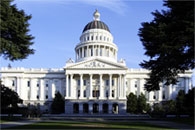Advertisement
Final Components of California Homeowner Bill of Rights Pass State Legislature

California Attorney General Kamala D. Harris has announced that the final parts of the California Homeowner Bill of Rights have passed out of both legislative houses and have been sent to the Governor’s desk. Senate Bill 1474 by Sen. Loni Hancock, D-Berkeley, gives the Attorney General’s office the ability to use a statewide grand jury to investigate and indict the perpetrators of financial crimes involving victims in multiple counties. Assembly Bill 1950, by Assemblymember Mike Davis, D-Los Angeles, extends the statute of limitations for prosecuting mortgage related crimes from one year to three years, giving the U.S. Department of Justice (DOJ) the ability to investigate and prosecute complex mortgage fraud crimes.
“The entire Homeowner Bill of Rights legislative package will ensure fair lending and borrowing practices for California homeowners,” said Attorney General Harris. “California has been the epicenter of the foreclosure crisis and this package of legislation will help affected homeowners, tenants and neighborhoods.”
On Gov. Brown’s desk is Assembly Bill 2610 by Assemblymember Nancy Skinner, D-Berkeley, which will require purchasers of foreclosed homes to give tenants at least 90 days before starting eviction proceedings. If the tenant has a fixed-term lease, the new owner must honor the lease unless the owner demonstrates that certain exceptions intended to prevent fraudulent leases apply.
Already signed into law is Assembly Bill 2314 Assemblymember Wilmer Carter, D-Rialto, which provide additional tools to local governments and receivers to fight blight caused by multiple vacant homes in neighborhoods.
In June, two key parts of the Homeowner Bill of Rights passed out of both houses of the Legislature and were signed by Governor Jerry Brown. Those bills, which came out of a two-house conference committee, provide protections for borrowers and struggling homeowners, including a restriction on dual-track foreclosures, where a lender forecloses on a borrower despite being in discussions over a loan modification to save the home. The bills also guarantee struggling homeowners a single point of contact at their lender with knowledge of their loan and direct access to decision makers.
All aspects of the California Homeowner Bill of Rights will take effect on Jan. 1, 2013 once signed into law.
About the author





